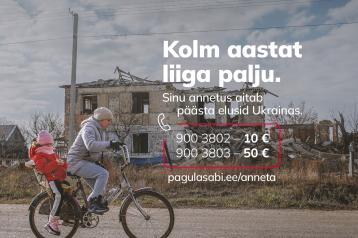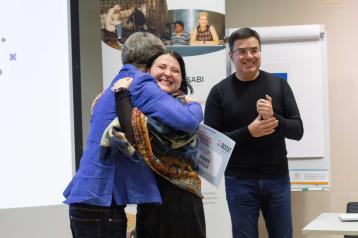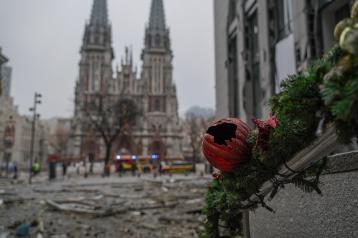- On December 6, the Estonian Refugee Council celebrated its 24th Anniversary. In our 24 years of operation our assistance has reached around half a million people. We have grown to become the largest humanitarian organisation in the Baltics and our team of more than 120 employees helps crisis-affected people in 6 countries. Thank you to everyone who help make this work possible!
- Our donation campaign “1000 days of War, 1000 warm homes” is active to help Ukrainian families living near the frontline survive the winter of war.
- On 7 November, we organised an international humanitarian conference in Tallinn, which focused on ethical dilemmas, preventive action, and the use of artificial intelligence. You can read a summary on our website, and watch videos of the speeches and panel discussions on our YouTube channel.
- In Estonia, 41 teams have been selected for the "Empowering Women" entrepreneurship program to proceed to a four-month incubation programme.
- In Ukraine, we continue to distribute winter support to cover heating costs for 5000 households during the upcoming winter season. Assistance will be provided in cash, or alternatively, firewood or coal will be delivered directly to those in need.
- A financial assistance programme is continuing in Ukraine to increase food security and self-sufficiency for vulnerable households and communities by improving the winter living conditions of livestock and poultry.
- In Armenia’s Lori region, a women’s livelihoods programme continues.
- In collaboration with the Estonian University of Life Sciences, we are assisting three schools in Armenia's Tavush region in implementing water- and energy-efficient agricultural solutions developed in Estonia to address water scarcity and promote environmental education. Three schools have now been selected.
- In Georgia, a cash assistance programme continues to support Ukrainian refugees living there through the winter months. For more information, visit the Estonian Refugee Council's website.
Ukraine
We provide cash-based assistance, which allows people affected by the war to purchase food, medicines, hygiene products, and other essentials. As of now, we have provided cash-based assistance to over nearly 295,500 conflict-affected people, totaling over 53 million euros. Cash assistance is provided for three months, with support of 3600 Ukrainian hryvnias per household member per month, equivalent to about 80 euros. Registration for assistance is carried out through Estonian Refugee Council's local registration points or via the online application platform. Currently, our focus is on assisting those in need in frontline areas in Zaporizhzhia, Donetsk, Luhansk, Kharkiv, and Kherson oblasts. The programme is funded by the European Union, the USAID's Bureau for Humanitarian Assistance (BHA), the United Nations Office for the Coordination of Humanitarian Affairs (OCHA) through the Ukraine Humanitarian Fund (UHF), and the Estonian Ministry of Foreign Affairs. Acted is the lead partner for EU and BHA projects.
This winter, we will assist about 5000 vulnerable households with heating aid. We are providing both financial and in-kind support to help cover rising heating costs and ensure fuel supplies for the winter. Registration and distribution of aid began in September, focusing on frontline and hard-to-reach areas in eastern and southern Ukraine—specifically in Donetsk, Kharkiv, Kherson, Luhansk, and Zaporizhzhia oblasts—where intensified hostilities and damaged infrastructure have severely hindered people's ability to meet their basic winter needs. In November, 1,503 vulnerable households were supported with cash for heating assistance, with the amount of 735,000 euros. The programme is funded by the European Union, the USAID's Bureau for Humanitarian Assistance (BHA), the United Nations Office for the Coordination of Humanitarian Affairs (OCHA) through the Ukraine Humanitarian Fund (UHF), and the Estonian Ministry of Foreign Affairs. Acted is the lead partner for EU and BHA projects. NGO YES is the sub-implementing partner for the UHF project.
We offer vulnerable women the opportunity to participate in entrepreneurship programmes to develop or create sustainable and crisis-resilient micro-businesses. In November, we procured and delivered assets to one existing business in Cherkassy region in the amount of 4,600 euros. We provided 112 hours of mentoring support and organised workshops to our beneficiaries. We started the procurement process for a business training provider which will be finalised by the end of December 2024. The entrepreneurship programme is supported by USAID’s Bureau for Humanitarian Assistance (BHA/USAID) in partnership with Acted and Garage48.
During November, we supported 215 households (538 individuals) from Kirovohrad, Poltava, Cherkasy, Kharkiv, Mykolaiv, Zaporizhzhia, Dnipropetrovsk, and Donetsk oblasts through an Emergency Livelihood Assistance programme, with a total amount exceeding 156,000 euros. The support is aimed at starting or continuing economic activities to improve self-reliance. Through this programme, we are supporting sectors related to agriculture, livestock farming, food production, and various services. The amount of support is up to 36,000 Ukrainian hryvnias, or approximately 800 euros. The programme is supported by the European Union, USAID’s Bureau for Humanitarian Assistance (BHA/USAID), and the Estonian Ministry of Foreign Affairs, and implemented in cooperation with Acted Ukraine.
In November we provided livelihoods support for livestock to 103 households (258 persons) from Kharkiv, Mykolaiv and Zaporizhzhia oblasts. The aid aims to increase food security and self-sufficiency of vulnerable households and communities affected by the war by protecting and restoring their food production and livelihoods. The programme provides financial assistance of up to 32,200 UAH to 180 households to ensure the wintering of livestock and poultry. Assistance can be received for the following activities: rehabilitation of animal shelter/barn (up to 17,200 UAH); animal feed (up to 12,000 UAH); veterinary services (up to 3,000 UAH). The programme is supported by the Estonian Ministry of Foreign Affairs.
We are part of the Joint Market Monitoring Initiative (JMMI), through which we assist the humanitarian community in maintaining a consistent overview of market conditions and the price levels of essential goods in Ukraine. Through JMMI, we can better prepare our cash-based assistance programs and direct them to the areas where help is most needed. Our data collection scope covers Zaporizhzhia, Kherson, and Donetsk oblasts.
Estonia
On November 7, an international humanitarian conference organized by Estonian Refugee Council took place at Fotografiska in Tallinn, focusing on ethical dilemmas, proactive measures, and the use of artificial intelligence in humanitarian aid. Read more on the Estonian Refugee Council's website. Watch the presentations and panel discussions here.
On November 13, the Estonian Refugee Council launched the donation campaign "1000 Days of War, 1000 Warm Homes," aimed at collecting donations in November and December to provide heating assistance for 1,000 homes near the frontline in Ukraine. Read more on the Estonian Refugee Council's website.
As part of the "1000 Days of War, 1000 Warm Homes" campaign, a Ukraine support event took place on November 19 at Freedom Square, where a thousand candles were lit to mark a thousand days since the start of Russia's full-scale invasion. Hundreds of people gathered to show support for Ukraine, and several individuals connected to Ukraine gave speeches. Read more on the Estonian Refugee Council's website.
We are running the "Edge Up" employability programme, aimed at people with a refugee background who wish to enter the job market or move on to a more suitable position. So far, six groups have completed the programme in Estonia and Latvia each. In Latvia we have partnered up with a local organisation Shelter Safe House. Each month, 10–12 people participate in the training. Registration for the programme is open. The employability programme is funded by the Interreg Baltic Sea Region Programme, with support from the European Regional Development Fund.
The third season of the Empowering Women entrepreneurship programme is underway, organised by the Estonian Refugee Council, Garage48, and Swedbank. On November 24, the final event of the entrepreneurship programme hackathon took place, where 60 teams presented their business ideas. The top 41 teams, including 14 teams featuring women with refugee backgrounds, advanced to the incubation programme, which will run until the end of March. The programme is co-financed by Swedbank, Garage48, the Estonian Refugee Council, the Estonian Association of Business and Professional Women, OBJEKT, and the European Union.
In collaboration with the Finnish organisation StartUp Refugees and the Latvian organisation Shelter “Safe House,” we are implementing a capacity-building programme to improve refugees' access to the labour market, based on mutual knowledge exchange. As part of the program, study visits were conducted in all three countries, aiming to share experiences, best practices, and address challenges. The final meeting between project partners took place in Tallinn on November 6–7. The project is funded by the Nordic Council of Ministers.
In collaboration with Haaga-Helia University of Applied Sciences, we are implementing an employability programme aimed at increasing the competitiveness of individuals with a refugee background in business and the labour market through the learning of artificial intelligence. At the end of November, a meeting of project partners was held in Tallinn to finalize the training programme. In December, a new meeting will take place, featuring trainers specializing in artificial intelligence topics.The programme is funded by the Interreg Baltic Sea Region Programme with support from the European Regional Development Fund.
We conduct monthly adaptation support training sessions on various subjects, including healthcare and social systems, adaptation for parents and pensioners, education system, entrepreneurship, legal issues in the context of Estonia and Ukraine, the labour market, and digital skills. The training sessions take place across Estonia, both in face-to-face and online formats, and have been attended by over 8,900 refugees so far. As of the end of October, a total of 2,288 people have participated in the training sessions this year. Changes in the procedures for applying for and extending temporary protection have created a high demand for training in this area. In November, we began conducting seminars on various legal grounds and residence permits, and we will continue these in the future. Currently, 160 participants have registered for these sessions.
We provide counselling by appointment at the Estonian Refugee Council office (Vambola 6, Tallinn) every day from 10 am to 5 pm. Our information hotline is open to all refugees, as well as institutions and individuals assisting them, at +372 5881 1311 (Monday to Friday from 10 am to 5 pm), and via email at counselling@pagulasabi.ee. Additionally, counselling services are available on Viber, WhatsApp, and Telegram at +372 5464 0007.
We offer support person service to all beneficiaries of international protection and their family members in Estonia. Our support persons are assigned to those in need by local municipalities. The support person service is funded by the European Union's Asylum, Migration and Integration Fund (AMIF) and the Ministry of the Interior.
We organise regular group activities and community events across Estonia. This year, nearly 3,500 people have participated in our community empowerment activities. Community activities are supported by the UN Refugee Agency.
Georgia
We continue providing financial assistance aimed at supporting Ukrainian refugees in Georgia during the cold season. In total, 160 households will receive assistance through this programme. Transfers are set to begin shortly, providing crucial support to help cover essential winter expenses. More info on Estonian Refugee Council's website. The programme is supported by the Estonian Ministry of Foreign Affairs.
Our Emergency Livelihoods Programme in Georgia, designed to empower Ukrainian refugees toward long-term self-sufficiency, is nearing completion. So far, 76 beneficiaries have been funded through this initiative, receiving support to either launch new businesses or enhance existing ones. The funded business ideas range from home-based salons and bakeries to small greenhouses, reflecting the resilience and creativity of our beneficiaries. The programme is supported by the Estonian Ministry of Foreign Affairs.
Our collaboration with local NGO MMRH to support community councils in Georgia continues to empower refugees and internally displaced persons by amplifying their voices and fostering community-driven initiatives. In November, the councils held two meetings: one online and one in person. They are now actively implementing the selected initiatives, which aim to address key challenges and enhance community well-being. Additionally, efforts are underway to explore ways of making the community councils sustainable, ensuring they can continue their work independently in the future. The programme is supported by ESTDEV – the Estonian International Development Cooperation Centre.
Armenia
As part of our environmental agriculture programme, three local schools from the Tavush rural area have been selected following visits and evaluations based on predefined criteria to develop water- and energy-efficient agricultural solutions, aiming to provide environmental education to schoolchildren. The programme is supported by the Environmental Investment Centre.
The Armenian office is running a women's livelihoods programme aimed at providing sustainable livelihood opportunities for forcibly displaced women from Nagorno-Karabakh residing in the Lori region. In November, we launched a call for applications and visited Vanadzor, a city in the Lori region, where we met with nearly 40 forcibly displaced women. During the visit, we presented the programme, answered their questions, and assisted those interested in applying. Out of 83 applications received, 30 will be selected for the incubation period scheduled for January. The programme is funded by the US Embassy in Armenia.
In November we signed and launched the project aimed at establishing community councils and self-help groups for refugees, empowering those from Nagorno-Karabakh to represent their views and support their independent livelihoods. First coordination meeting was held by the donor, EU Delegation in Armenia, with the involvement of other consortia to familiarise ourselves with the project and establish a coordination mechanism. Additionally, we attended a grants procedural and financial workshop organised by the lead organisation. Preliminary work for the project is ongoing and will continue through November and December. The project is funded by the European Union.
Jordan
In Jordan, our focus is on vulnerable female-led households. We are preparing for the next phase of the programme, where we will develop our training centre and provide training for 40 women, with support for 12 to establish hydroponic greenhouses on their own land. The greenhouses enable women to grow food for their own families or enhance their income by selling produce. Additionally, we will conduct hydroponics training for four female-led community organisations to increase knowledge of water-efficient agricultural methods in the entire region. The activities of the Estonian Refugee Council in Jordan are supported by ESTDEV – Estonian Centre for International Development.
Lebanon
In collaboration with the local organisation Nusaned, we are providing cash assistance to people in Lebanon who have fled their homes due to armed conflict, helping them meet their basic needs related to finding emergency shelter. Donations can be made through the Estonian Refugee Council's website to alleviate the humanitarian crisis in Lebanon. The Estonian Refugee Council's activities in Lebanon are funded by the Estonian Ministry of Foreign Affairs.





